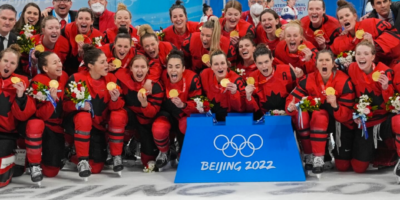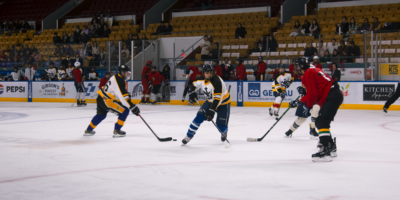This February, hockey fans will get to watch a “best-on-best” international tournament for the first time in nine years…or so we’ve been promised. The 4 Nations Face-Off, taking place from February 12-20 in Montreal and Boston, will be the first international tournament to feature NHL players since the 2016 World Cup of Hockey. With no NHL Olympic participation in over a decade, it’s safe to say fans have been waiting for this event, which will be a taste of what’s to come when the NHL returns to the Olympics in 2026 (or so is the current plan).
At the 2024 NHL All-Star Game, it was announced that The 4-Nations Face-Off would occur in place of the 2025 NHL All-Star Game. The tournament will feature exclusively NHL players from—you guessed it—four nations: Canada, United States, Finland, and Sweden. 2024 progressed, dates and venues were announced, and complete team rosters were unveiled on December 4th (we could go on about roster snubs all day). This is the first time we’re going to see Connor McDavid and Sidney Crosby on Team Canada together, multiple sibling pairs on Team USA, and many of the NHL’s young stars representing their countries for the first time since making the league. The NHL has been hyping up the tournament for months, and fans are looking forward to it. That being said, some feel that the “best-on-best” claim should not be used to describe it.
The main argument for this has been beaten to death online from hockey bloggers and sports writers: there aren’t enough teams. It’s been beaten to death because, well…it’s kind of true. A tournament with only four teams feels small, but people who watch international hockey might counter that by saying that not many other countries would legitimately be able to compete with those four. The elephant in that room, of course, is Russia, who has been banned from competition by the International Ice Hockey Federation (IIHF) since 2022. It’s completely understandable that the NHL would not include Russia for the same reasons as the IIHF. That doesn’t come as a surprise, and I agree that they shouldn’t be included. But without Alexander Ovechkin, who is 19 goals away (at the time of writing this) from beating Wayne Gretzky’s career goal record of 894, is the tournament really best-on-best?
At the time of the announcement, all four teams were in the top six of the IIHF Men’s rankings. Germany, who has improved immensely in recent years, was actually ranked above Sweden in 5th, however, they were unable to participate because there are not enough German NHL players to make a full roster. This brings up the limitation the tournament has by only including NHL players. Even when the Olympics had NHL participation, European countries have included non-NHL players on their rosters. Whether or not the leagues these players are from meet the caliber of the NHL is debatable, but that’s where the best hockey players from those countries play. However, this is a tournament being put on by the NHL, not the IIHF or International Olympic Committee, so this argument falls apart quickly. We’ll get to see Germany at the 2026 Olympics, though, and with all the young German players coming into the league recently, we might see them at an NHL-only tournament like this one day.
One excluded country that could potentially have enough NHL players for a full roster is Czechia, ranked 8th by the IIHF at the time of the tournament announcement. Boston Bruins star forward David Pastrňák expressed his disappointment of being left out, although he understood the NHL had limited time to organize the event (Ryan, 2024). We’ll have to wait until the 2026 Olympics to see Pastrňák, who has never played at the Olympics but was a member of the 2024 IIHF World Championship team that won gold, in action with Czechia.
Czechia and Germany (and Russia, IIHF permitting) aren’t the only ones either. There’s NHL talent from countries such as Slovakia, Switzerland, Denmark, and Latvia that will be left out of the tournament. Hockey has developed hugely in these countries recently, and while the majority of NHL players are still North American, there are plenty of European stars in the league now, just perhaps not enough from some of the smaller countries to make a full 23-player roster.
At the 2016 World Cup of Hockey, another NHL-sanctioned event which had eight participating teams, a Team Europe was included, made up of players from countries that were not participating in the tournament. Noting that Czechia did have their own team there, the roster was primarily German and Slovakian players, while also including players from Switzerland, Denmark, Austria, France, Norway, and Slovenia (albeit one player from each of those last four). At the time, LA Kings captain Anže Kopitar expressed excitement about the concept of having a Team Europe, as he rarely has opportunities to compete in the top level international tournaments as a Slovenian (Johnston, 2015). To top it all off, Team Europe won the silver medal behind Canada at that World Cup, so it’s not as if they weren’t competitive.
A Team Europe-esque idea would’ve made The 4-Nations more interesting with more of the NHL able to participate, and I don’t think a lot of fans would’ve been opposed. Sportsnet even entertained the idea by putting together a hypothetical roster (Madge, 2024). Pastrňák on a top line with Leon Draisaitl? I’d want to see that. Get Kopitar in there again too, and maybe get some Norway representation with Mats Zuccarello. Hockey fans would all have fun putting together their own 2025 Team Europe lineup.
At the end of the day, though, keeping it to the main four teams is understandable. There are a lot of things that go into organizing a tournament like this for the NHL, and maybe this was all they wanted to do. People are still going to watch it anyway because it’s been so long since NHL players have participated in international events like this. Sure, we won’t get to see everyone, but after being deprived for so long, we’ll all be watching (“we” being rabid Team Canada fans, of course).
And besides, when you really think about it, this is just a one-off event. The real best-on-best of international hockey is going to happen at the 2026 Olympics in Italy, which nearly all the teams of the left out countries have qualified for (Sorry, Norway and Slovenia. And Austria and France, if we’re talking about 2016 Team Europe). The 4-Nations Face-Off is just a partial preview for those Olympic Games, and I’m sure it won’t disappoint in that aspect.
Citations:
Hartman, M. (2024, December 25). Everything wrong with the 4 nations face-off. Editor In Leaf. https://editorinleaf.com/everything-wrong-with-the-4-nations-face-off-01jehvwhcypc/3
Friedman, E. (2024, December 5). 32 Thoughts: Some Surprises on 4 Nations Face-Off Rosters. Sportsnet. https://www.sportsnet.ca/nhl/article/32-thoughts-some-surprises-on-4-nation s-face-off-rosters/
Ryan, C. (2024, February 5). Pastrnak irked by absence of Czech players in NHL international tournament. Boston.com. https://www.boston.com/sports/boston-bruins/2024/02/05/david-pastrn ak-nhl-boston-bruins-czech-republic-hockey/
Madge, J. (2024, August 19). What would a Team Europe look like for 4 Nations Face-Off in 2024-2025. Sportsnet. https://www.sportsnet.ca/nhl/article/what-would-a-team-europe-look-like -in-2024-25/
Johnston, C. (2015, January 24). Kopitar dreaming big for upcoming World Cup. Sportsnet. https://www.sportsnet.ca/hockey/nhl/kopitar-dreaming-big-for-upcoming-world-cup/
Spooner, R. (2024, October 21). NHLers by Country. The Hockey Writers. https://thehockeywriters.com/current-nhl-players-by-country/





Leave a Reply